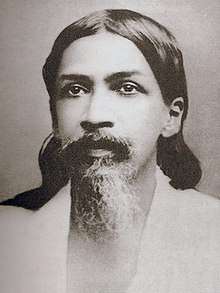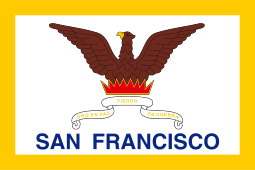California Institute of Integral Studies
California Institute of Integral Studies (CIIS) is a private, non-profit university founded in 1968 and based in San Francisco, California.[1][2][3] As of 2020, it operates in two locations; the main campus near the confluence of the Civic Center, SoMa, and Mission districts, and another campus for the American College of Traditional Chinese Medicine in the Potrero Hill neighborhood.[4] CIIS has a total of 1,510 students and 80 core faculty members.[5]
_-2.jpg) The main campus building of CIIS (2020) | |
| Type | Private, non-profit |
|---|---|
| Established | 1968 |
| President | Judie Wexler |
| Students | 1,510 |
| Location | , , United States |
| Website | www |
_campus_with_community_clinic_(2020).jpg)
| Sri Aurobindo |
|---|
 |
|
Family
|
|
|
Speeches and books
|
|
Teachings
|
|
Places
|
|
Communities |
|
Disciples
|
|
Journals and Forums |
CIIS consists of four schools: the School of Professional Psychology & Health, the School of Consciousness and Transformation (mainly humanities subjects), the School of Undergraduate Studies, and the American College of Traditional Chinese Medicine (ACTCM). ACTCM became the fourth school after merging with CIIS on July 1, 2015.[6]
The institute offers interdisciplinary and cross-cultural graduate studies in psychology, counseling, philosophy, religion, cultural anthropology, transformative studies and leadership, integrative health, women's spirituality, and community mental health.[7] Many courses combine mainstream academic curriculum with a spiritual orientation, including influences from a broad spectrum of mystical or esoteric traditions. Although the Institute has no official spiritual path, some of its historical roots lie among followers of the Bengali sage Sri Aurobindo.[8]
History
American Academy of Asian Studies (1951-1968)
The California Institute of Integral Studies (CIIS) grew out of the earlier American Academy of Asian Studies, founded by Louis Gainsborough in 1951.[9][10] Other early contributors to the founding of the academy includes Frederic Spiegelberg.[11] The academy was an independent educational institution set up to study Eastern culture and philosophy [9] and improve the dialogue between east and west.[10] Soon after the founding of the institution Gainsborough was joined by Alan Watts and Haridas Chaudhuri; two persons that played a crucial role in the development of the academy's academic profile.[10]
Both Watts and Chaudhuri were oriented towards eastern religions and philosophy and integrated this into their teaching and colloquium. Watts, a teacher of eastern mysticism, established the academy as a meeting place for counter-cultural movements, also known as the San Francisco Renaissance. Chaudhuri, a scholar of Aurobindo, developed the field of Integral counseling psychology, an integration of eastern philosophy with the growing field of counseling psychology.[10] According to sources “Chaudhuri’s vision of integral education, like that of Alan Watts, was based on connecting the cultural traditions of the East and the West”.[10]
California Institute of Asian Studies (1968-1980)
In 1968, Chaudhuri was instrumental in the founding and development of a new institution called the California Institute of Asian Studies.[10][12] The new institution grew out of the former American Academy of Asian Studies, which was winding down. In this period several developments took place. Paul Herman continued the work of Chaudhuri and also designed the Institutes first graduate degree in Integral Psychology, the Integral Counseling Psychology (ICP) degree, which was established in 1973.[10]
Frederic Spiegelberg, who helped found the predecessor American Academy of Asian Studies, served as the institutes second president, from 1976 to 1978.[9][11]
California Institute of Integral Studies (1980-present)
In 1980 the institute underwent a change of name, now emerging as the California Institute of Integral Studies.[12]
In 1981, the institute was granted regional accreditation [12] and became member of the national community of colleges and universities.[10] By the mid-eighties several academic programs were available, including the Clinical Psychology program, the Counseling Psychology program, and the East/West Psychology program. Several new programs were also launched in the 1985-86 academic year, including the Organizational Development and Transformation certificate program, and the External Studies program. Other services, available to students at this time, included an extensive library, as well as the Integral Counseling Center, a community-based service facility that supported the training needs of clinical and counseling students.[12]
In 2008, the San Francisco Chronicle reported that psychology students at the New College of California were transferring to the California Institute of Integral Studies, due to the closing down of the former institution.[13]
In 2012, the CIIS, with support from the Aetna foundation, announced that it was introducing its new onsite health and wellness coaching program to San Francisco's Mid-Market District. The program was to be of benefit to children and families living at 10th & Mission Family Housing, a supportive housing project run by Mercy Housing California .[14] In 2013 Jordan[15] published a case report that summarized the experiences from the integrative wellness coaching (IWC) project among homeless and low-income individuals in San Francisco. The IWC model was, at this time, included in the master of arts program in Integrative Health Studies at the California Institute of Integral Studies.
Philosophical background
Central to the early history of the Institute is a model of so-called integral education. Originally set up to study Eastern culture and philosophy in the beginning of the 1950s,[9] the institute developed further in this direction with the arrival of Haridas Chadhauri. Chaudhuri introduced the integral philosophy of Sri Aurobindo as a navigating principle for education and established a perspective that sought a holistic view of the human being; an integration of material and spiritual values; as well as an integration of eastern and western philosophies and worldviews.[10][12] By the mid-eighties this model of education was firmly established. In 1985 Voigt [12] reported on the graduate programs at CIIS and elaborated on the experience of integral education at the institute. In the late 1990s, the CIIS was one of several institutions in the USA associated with the study of Holism and Consciousness.[16]
There is also a connection between the roots of CIIS and the Human Potential Movement of the 1950s and 1960s. Among the students who attended the colloquia at the American Academy of Asian Studies in the 1950s was Michael Murphy and Richard Price, founders of the Esalen Institute at Big Sur.[10] According to Gleig and Floress,[17] "one can trace a direct line from Integral Yoga through [the Cultural Integration Fellowship] to two of the major centers of the Human Potential movement and the transpersonal psychology field it birthed: Esalen and the California Institute of Integral Studies (CIIS)."
Gleig and Flores further explain that:
CIIS's distinctive signature is the development of an integral education that combines academic scholarship with spiritual transformation and through its student body, faculty publications, and popular public program it has significantly shaped contemporary East-West spiritualities. As with the other main creative lineage centers - Esalen and CIF - CIIS is committed to a pluralistic spiritual vision and its Aurobindo roots are somewhat hidden.[17]
According to Jim Ryan, CIIS, as developed by the founder (Chaudhuri), "had a very wide academic reach, far beyond its basic East-West philosophy concentration. Theses and dissertations were done over many years on the politics, economics, anthropology, sociology, and area studies of many nations of the world."[18]:52
Accreditation and exam pass rates
CIIS is an accredited member of the Western Association of Schools and Colleges (WASC).[19] In addition, degrees offered through ACTCM are accredited by the Accreditation Commission for Acupuncture and Oriental Medicine (ACAOM).[20]
In 2018, The Board of Behavioral Sciences (BBS), California's state regulatory agency responsible for licensing, examination, and enforcement of Licensed Marriage and Family Therapists (LMFTs), released statistics for its January 1, 2018 through June 30, 2018 exam cycle.[21]
- CIIS examinees' pass rate was 82% (Standard exam), compared with a 77% pass rate for all schools in California.
- 83% of CIIS first-time Standard exam-takers passed, compared with an 80% pass rate for California schools overall.
The Doctor of Psychology (PsyD) program in Clinical Psychology is not accredited by the American Psychological Association (APA). The program received APA accreditation in 2003, but accreditation was revoked in 2011, and CIIS's appeal of the revocation denied in 2012.[22][23][24] CIIS applied for APA accreditation in June 2016, but voluntarily withdrew its application in June 2017.[25]
Notable people
- Angeles Arrien
- Dave Carter
- Haridas Chaudhuri
- Nadinne I. Cruz
- Angela Davis
- Andrej Grubacic
- Stanislav Grof
- Will Hall
- Judith Hanson Lasater
- Noah Levine
- Joanna Macy
- Robert A. McDermott
- Starhawk
- Brian Swimme
- Richard Tarnas
- Judith Tyberg
- Douglas Vakoch
- Alan Watts
References
- Taylor, Bron R. (2005). The encyclopedia of religion and nature (1 ed.). London [u.a.]: Thoemmes Continuum. p. 251. ISBN 9781843711384. OCLC 315210594.
- Otterman, Sharon. "Merging Spirituality and Clinical Psychology at Columbia". New York Times, Aug. 9, 2012
- Aanstoos, C. Serlin, I., & Greening, T. (2000). History of Division 32 (Humanistic Psychology) of the American Psychological Association. In D. Dewsbury (Ed.), Unification through Division: Histories of the divisions of the American Psychological Association, Vol. V. Washington, DC: American Psychological Association.
- "Map and Directions". www.ciis.edu. Retrieved 2020-03-30.
- http://www.ciis.edu/about-ciis/ciis-at-a-glance
- "ACTCM at CIIS - American College of Traditional Chinese Medicine". www.actcm.edu. Retrieved 2016-12-01.
- Psychology & Psychiatry Journal. "California Institute of Integral Studies Launches Groundbreaking Community Mental Health Program". Psychology & Psychiatry Journal; Atlanta, Feb 2008: 4.
- "From the American Academy of Asian Studies to the California Institute of Integral Studies"
- New York Times Staff. Frederic Spiegelberg, Religion Teacher, 97. The New York Times, 1994
- Subbiondo, Joseph L. CIIS and American Higher Education. Integral Review, June 2011, Vol. 7, No. 1
- Stanford University News Release: Comparative religions expert Frederic Spiegelberg dies at 97. Stanford University News Service, 11/15/94
- Voigt, Walt. Bridging East and West in Graduate Education: The California Institute of Integral Studies. The Humanistic Psychologist , 27 Vol. 13, No. 3, Autumn 1985.
- Schevitz, Tanya. "Stark lesson as San Francisco college close". San Francisco Chronicle online, June 20, 2008. Retrieved 07 April 2018.
- "Wellness; California Institute of Integral Studies, Aetna Foundation Bring Free Wellness Coaching to Supportive Housing Residents in San Francisco". Pediatrics Week; Atlanta [Atlanta]11 Feb 2012: 64.
- Jordan, Meg. «Health Coaching for the Underserved». Glob Adv Health Med. 2013 May; 2(3): 75–82.
- McManis, Sam. "University with a Vision / JFK's holistic studies program attracts devoted students -- and strong critics". San Francisco Chronicle online, October 9, 1998. Retrieved 07 April 2018.
- Ann Gleig and Charles I. Flores (2013), "Remembering Sri Aurobindo and the Mother: The Forgotten Lineage of Integral Yoga" (chapter 2) In: Singleton, Mark; Goldberg, Ellen (2013). Gurus of Modern Yoga. Oxford University Press. ISBN 9780199938704. OCLC 861692270.
- Jim Ryan, "The Complete Yoga: The Lineage of Integral Education" in: Gunnlaugson, Sean Esbjörn-Hargens, Jonathan Reams, Olen (2010). Integral education new directions for higher learning. Albany: State University of New York Press. pp. 47–54. ISBN 9781438433509. OCLC 658060931.
- "WASC: Statement of Accreditation Status, California Institute of Integral Studies". Directory.wascsenior.org. 2013-11-14. Archived from the original on 2013-12-06. Retrieved 2013-12-03.
- "Accreditation & Approval".
- "Board of Behavioral Sciences: EXAM RESULTS BY SCHOOL" (PDF). Board of Behavioral Sciences. June 30, 2018. Retrieved August 5, 2019.
- Accredited Programs in Clinical Psychology , American Psychological Association. Accessed online January 25, 2013.
- CoA Statement and CIIS Response to Revocation of Accreditation "Archived copy". Archived from the original on 2013-09-15. Retrieved 2013-08-08.CS1 maint: archived copy as title (link), American Psychological Association. Accessed online January 25, 2013.
- "All Approved Doctoral Programs Listed by Jurisdiction". National Register of Health Service Providers in Psychology. Retrieved 8 September 2014.
This program’s accreditation has been revoked. (Under Appeal)
- "Programs Applying for Initial Accreditation". American Psychological Association. Retrieved 2016-11-30.
External links
| Wikimedia Commons has media related to California Institute of Integral Studies. |
.jpg)
